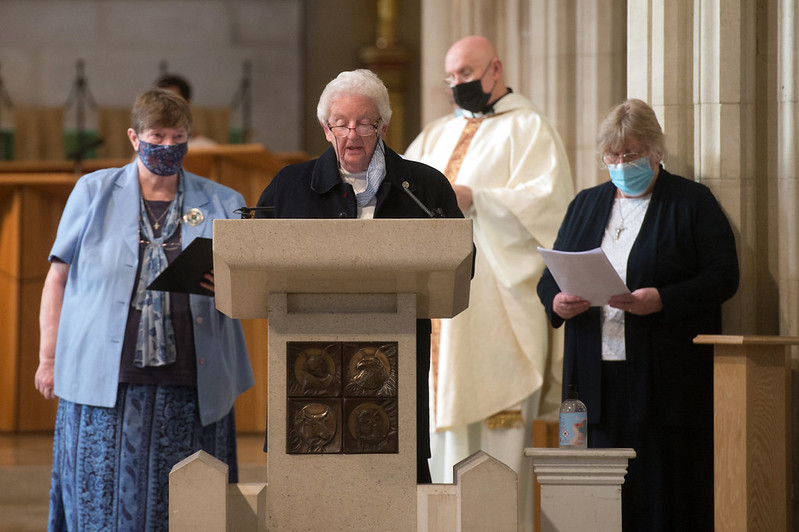My introduction to being a lector came through the invitation of another parish minister—not the pastor or another lector but the choir director. She encouraged me to minister at the lectern rather than in the choir loft. People familiar with my singing suggested that her discernment spared the whole parish.
The role of lector seemed to suit me, and I was encouraged by comments of fellow parishioners. Several years passed without incident. But my turn as lector one Sunday a half dozen years ago stands out because that morning I messed up the reading. Somehow I momentarily lost my place after glancing at the assembly, and I skipped a whole paragraph of the text. When I realized my mistake, I apologized to the assembly, returned to the correct place, and completed the reading uneventfully.
To my surprise, my lapse convinced one listener to volunteer as a lector. As he explained to our parish administrator, he had appreciated hearing me read other times but was sure he could never do that himself. My faux pas, however, gave him courage. He saw that it wasn’t a disaster and realized he could probably handle that himself. It was a modest taste of what St. Paul discovered: God’s power works just fine when we are at our weakest. We can’t take ourselves too seriously or measure success by how we feel.
The role of lector, however, does deserve to be taken seriously. It stands to reason that if the church “has always venerated the scriptures as it has venerated the Body of the Lord,” as the Second Vatican Council’s Dei Verbum (Constitution on Divine Revelation) puts it, then anyone reading scripture to the worshiping assembly must do so with deep reverence. Since they are “engaged in the ministry of the word,” lectors should participate in the injunction to priests, deacons, and catechists to “immerse themselves in the scriptures by constant spiritual reading and diligent study.” Obviously a lector needs to personally and prayerfully assimilate the message of reading before trying to proclaim it to the rest of the parish.
In the retirement community where we now reside, my wife and I are both lectors again. And we never presume to read at Mass without preparing in advance, usually the previous day. That time alone in the chapel suggests new meaning for the expression “practicing Catholic.”
What’s involved is more than the obvious necessity of getting familiar with the text and resolving any pronunciation issues. It’s also the chance to discover the flow of the passage, catch its tone, and identify the climax.
Scripture scholar Father Gerard Sloyan encourages lectors to be “so at home in the sacred stories, commands, and exhortations that they never miss the rhetorical intent of the writings or the Anglicized pronunciation of Hebrew and Greek proper nouns.” A challenging standard!
My prayer always is that I will not get in the way or distract people from the message I proclaim. I want the hearers to receive the living Word of God, to be instructed, challenged, inspired, and healed in whatever way God wants. I feel responsible for lifting printed symbols from the page and breathing life and energy into them so the Spirit may more easily transform listening hearts with the reading’s message. It’s like a musician converting dots on a staff into audible music. The message, the music, is what matters.
I see the lector as the good steward in the gospel parable, offering the parish family the prescribed portion of the Lord’s word for their nourishment. I’m doling out part of the first course at the liturgical meal where we always feed on the word before we feed on the Eucharist. If I do my part well and truly release the word of the Lord in the community, the “Thanks be to God” will be fervent and heartfelt.
My hope is that listeners in the pews might be so touched by the scripture that they can hardly wait to get home to their own Bible, to rediscover and savor the rest of the story—the way young children are sometimes stirred by a parent’s reading to take up a book on their own. Qualified lectors, Sloyan suggests, should be so steeped in the Bible that their “enthusiasm for it is infectious.”
The late Bishop Kenneth Untener of Saginaw, Michigan once spoke wistfully of a future time when the readings at Mass might be consistently proclaimed as forcefully as they deserve. He imagined a Catholic inviting a Protestant friend to join him at Eucharist and elbowing him excitedly before the readings and saying something like, “Here it comes now. Wait till you hear this!” This is a bishop’s dream that a lector can also share.
This article appeared on the June 2008 issue of U.S. Catholic (Vol. 73, No. 6, pages 37-38).
Image: Flickr cc via the Catholic Church of England and Wales














Add comment